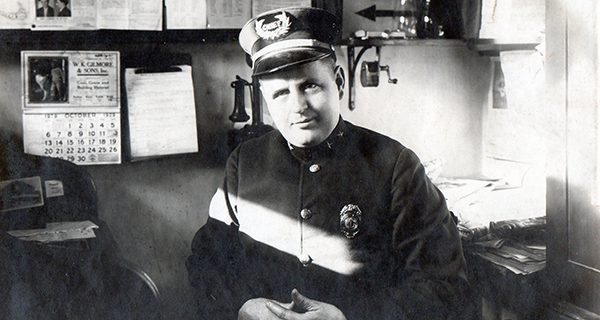[ccfic caption-text format="plaintext"]
It was 100 years ago this month that riots broke out in the city of Boston. The Boston police had gone out on strike. A recent Boston Globe article recorded that “Roaming mobs looted stores. Eight people were shot dead over four violent days. All this followed an overwhelming vote by Boston police on Sept. 8, 1919, to walk off the job, striking for better working conditions and the right to form a union. It was the country’s first major police strike, and it caused a national uproar, feeding fears of revolution and communist infiltration at a time of growing labor unrest.”
“And when it was over, after Boston had been placed under military watch for the first time since the Revolutionary War, the police union was smashed and the governor who fielded troops against the strikers, Calvin Coolidge, was on his way to the White House. All told 1,142 Boston police officers were dismissed and never regained their jobs. Many of the police were Irish-Americans and Ireland-born immigrants. They worked more than 80 hours a week without overtime and received starting pay of 25 cents an hour — one-third less than city laborers were paid. They slept in rat- and lice-infested station houses where vermin ate the leather off their helmets. They weren’t paid for court appearances and they couldn’t leave the city without a pass. They felt they were standing up and doing what they thought was right.”
“Once the strike began, panicked residents fled with their valuables. Shopkeepers placed barbed wire in their windows and armed guards stood at doors.” Following the Russian Revolution, many feared that such strikes were the work of Communists and Bolsheviks.
Governor Coolidge also took a hard line against the strikers. He denounced them as “deserters” and “traitors,” and said “there is no right to strike against the public safety, anywhere, anytime.” With no police in the city, Coolidge ordered nearly 5,000 State Guard troops to Boston. WWI veterans were especially critical of the strike. In Medfield, WWI veteran Nathaniel D. Allen delivered a seething editorial against the strike, saying “the four million American Legionnaires will keep faith with the boys who fell in France and Flanders … and smash any and all unions.”
The strike ended when Boston Police Commissioner Edwin Curtis fired all the strikers and replaced them with 1,500 new officers at higher wages. None of the strikers was rehired by the Boston police.
One of those striking Boston police officers was Coleman John Hogan, who would go on to play a major role in the town of Medfield. Coleman was born, November 12, 1890, in Boston. He married Marietta Sharkey on November 19, 1911, when he was 21 years old. They would go on to have two children: John and Jean. Coleman was described on his WWI draft registration form as being 5'9" tall, slender, with blue eyes, brown hair and a light complexion. He was first appointed to the Boston Police Department on February 25, 1918, as a Reserve Officer in Division 16.
Coleman, known as “Coley” Hogan, joined his fellow officers in the Boston Police Strike. As a result of his participation, Hogan, along with 1,142 other police officers, was fired from his job and forced to find other employment. Hogan left Boston after the strike and was hired first as a patrolman in Walpole, later becoming the department’s chief. He applied for and was appointed Medfield’s chief of police in 1926.
At first, Hogan and his family were renting in Medfield on Pleasant Street. By 1935, he bought and owned a home on 35 Miller Street, where he lived until his death in 1958. He continued as chief for 30 years until his retirement in 1955. He became devoted to his adopted Medfield and was widely supported and admired by its citizens as Medfield evolved from a farming community to a residential one. Upon his retirement, he became Medfield’s longest serving police chief.
He concluded his final report to the town by saying: “This concludes my last report in this last year of my career as your first Chief of the Police Department. Although there naturally have been problems of varying degrees of importance during my 30 years as Chief, I believe that each one has been handled and disposed of in the best interest of the inhabitants of the Town of Medfield. I wish finally to express my abiding appreciation to the people for the trust and confidence that they have reposed in me during the long period of time during which I have served them to the best of my ability and sincerely wish my successor and the Town a pleasant passage of time.”
Coleman John Hogan died on May 13, 1958, at the age of 68. Following a funeral Mass at St Edward Church, he was interred in Vine Lake Cemetery.









